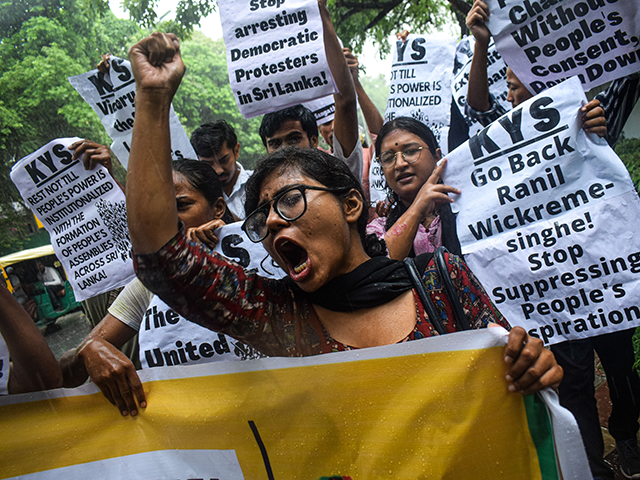The Sri Lankan Health Ministry on Monday asked residents to resume using face masks, social distancing, and aggressive hand washing to control the spread of the Wuhan coronavirus.
Sri Lanka has been wracked with massive protests for weeks, during which there was little evidence of masking or social distancing, and the government has collapsed so thoroughly that people are more worried about food and fuel than masks.
Health Minister Janaka Chandragupta and Deputy Director-General of Health Services Dr. Hemantha Herath warned that coronavirus cases are rising on the beleaguered island, with 56 new cases reported on Sunday, so the resumption of social distancing measures was requested.
The Democratic Socialist Republic of Sri Lanka mandated the wearing of masks in early 2020 but discontinued the requirement on June 10 of this year after vaccination rates reached 55 percent. Chandragupta told residents to get a fourth vaccination shot as quickly as possible, in addition to resuming mask usage.
Adding to Sri Lanka’s many woes is a fast-spreading outbreak of dengue, a virus most commonly spread through mosquitoes. 8,200 new cases of dengue have been reported so far in July, a situation described by National Dengue Control Unit director Dr. Sudatha Samraweera as a “dangerous” and “severe” epidemic.
Monday was declared “Dengue Day” in Sri Lanka, an event the island has held several times in the past during major surges of the fever. Dengue Days are dedicated to clearing areas where mosquitoes breed, repairing protective screens, and similar precautions.
There are still protesters on the streets because they wanted Prime Minister Ranil Wickremesinghe to resign and make a clean sweep of the island’s corrupt and irresponsible socialist government — but, instead, Wickremesinghe became the new president last week following the departure of dynastic ruler Gotabaya Rajapaksa. A crackdown on protesters using police and military forces was among Wickremesinghe’s first acts in office.
Sri Lanka’s economy is heavily dependent on tourism, especially Chinese tourism — an industry devastated by the arrival of the Wuhan coronavirus in 2020. Wickremesinghe is openly pleading with Beijing for help, including more purchases of Sri Lankan tea and spice exports and more Chinese investment in local enterprises.
Perhaps worried that Chinese tourism is unlikely to recover as long as the island is seen as having a coronavirus problem, Sri Lanka began aggressively courting Indian tourists in early July, including a planned series of traveling roadshows extolling the virtues of Sri Lankan scenery and culture.
Australia’s ABC News noted that Sri Lankans living in Australia spent the past week packing up groceries to send home to their relatives, so they apparently have little confidence in Wickremesinghe’s ability to avert an economic meltdown. Charitable donations of food and medicine are flowing back to the island from Sri Lankan communities abroad.
Sri Lankan emigrants who spoke with ABC expected the new president to invest more effort in controlling protesters than feeding them. Some activists glumly noted that it was best to send the folks back in Sri Lanka food they could easily prepare without electricity since the power grid is teetering on the brink of collapse.

COMMENTS
Please let us know if you're having issues with commenting.